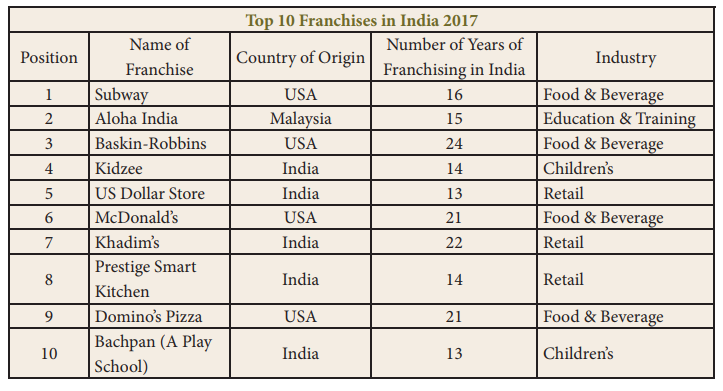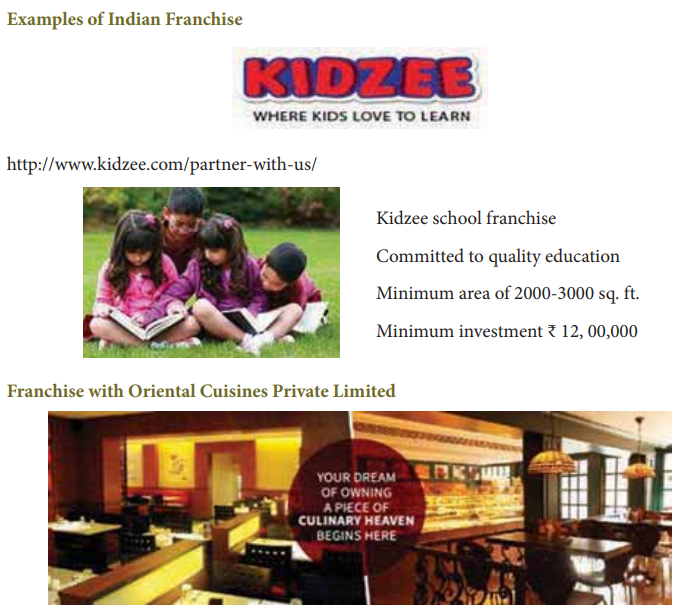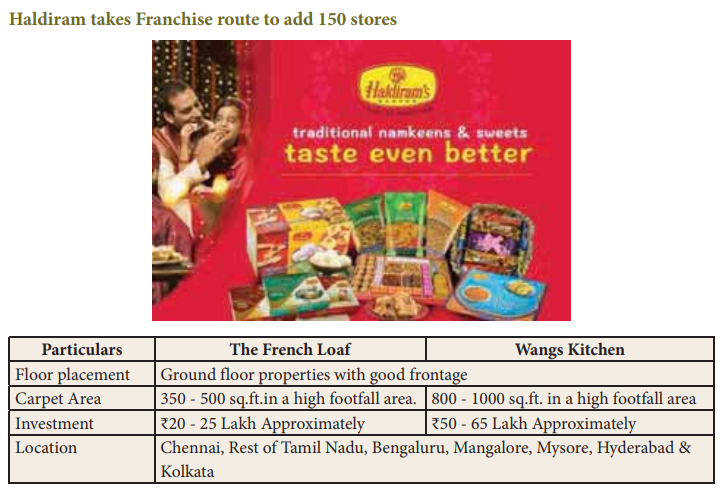Meaning, definition, Characteristics, Types, Advantages, Conclusion - Franchising | 11th Commerce : Chapter 16 : Emerging Service Business in India
Chapter: 11th Commerce : Chapter 16 : Emerging Service Business in India
Franchising
FRANCHISING
Meaning and definition
One of the key components of success of
any business lies in its ability to reach out to customers at local, national
and global level. Franchising has often been used as a method for expanding domestic market and
for entering international markets. A wide variety of goods and services are
now made available to customers using this model. Franchising is used by
businesses for marketing and distributing products and services.
According to International Franchise
Association a franchise is a “continuing relationship in which the franchisor
provides a licensed privilegetodobusiness, plus assistance in organising
training, merchandising and management , in return for a consideration from the
franchisee.”
As explained in Wikipedia, franchising is “the practice of the right to use a firm’s business model and brand for a prescribed period of time. ... For the franchisor, the franchise is an alternative to building “chain stores” to distribute goods that avoids the investments and liability of a chain”.
There
are two parties to a franchising agreement
Franchisor: The owner of a business who
provides the franchise. Generally he owns the patent / trademark and offers it
to the franchisee under a licensing agreement. Depending on the agreement, the
franchisor may also provide support services like service/product training,
marketing, advertising, etc. The franchisor levies fees in the form of royalty.
Franchisee: The individual who acquires the right to operate the business or use the trademark of the seller is known as the franchisee.
Characteristics of franchising
·
Franchise relationship is based on an
agreement which lays down terms and conditions of this relationship.
·
The term of franchise may be for 5 years
or more. The franchise agreement may be renewed with the mutual consent of the
parties.
·
The franchisee gives an undertaking not
to carry any other competing business during the term of the franchise; and the
franchiser gives an undertaking not to terminate the franchise agreement before
its expiry except under situations which may justify the termination of the
franchise agreement.
·
The franchisee agrees to pay specified
royalty to the franchiser, as per terms of the franchise agreement.
·
Franchise means selling the same product
and maintaining a similar type of shop
decor (i.e. style of interior decoration) for which franchiser provides assistance
to franchisee in organising,
merchandising and management. The franchiser virtually sets up the business for
the franchisee.
·
Franchisee is supposed to follow parent
company’s policies regarding mode of business operations, as per clauses in the
franchise agreement.
· Franchiser may give training to personnel working in the franchisee’s organization.
Types of franchising
There are primarily two types of
franchising
a.
Product/ trade name franchising: In this type, the
franchisee exclusively deals with a manufacture’s product. Examples include
Kidzee, French Loaf outlets, Bharat Petroleum bunks,Patanjali products, etc.
Relationships like Maruti Suzuki with ABT Maruti or Hero Honda bike dealerships
may be considered as franchises. However, they but should be considered more as
exclusive dealerships with more operational freedom for the dealers.
b. Business format franchising: When a franchisor awards rights covering all business aspects as a complete business package to the franchisee it is called as business format franchising. This package includes training , support and the corporate name. This enables uniformity of products, services, environment across geographical boundaries with a high degree of standardisation. Examples are McDonald’s, Pizza Hut. KFC, Hot breads, Titan, Color plus, Zodiac, Lakmé beauty parlour.
Advantages of franchising
Reduced
risk: The franchisee will acquire the right of running an
already established business, thus eliminating the risk of starting a new
business.
Business
expansion: Franchising provides an opportunity to expand
business at regional, national and global levels without incurring additional
expenditure. Thus rapid growth of franchisor’s business is facilitated.
Cost
of advertising: The cost of advertising for the
franchisor will be reduced since this cost will be shared by the franchisee. Moreover, it enables the
franchisor to reap the benefits of increased visibility across regional and
national boundaries.
Operational
support: The franchisee is provided assistance in not only
obtaining finance,but also in deciding business location , decor /design, staff
training, and handling day to day operations.



Advantages of franchising
Franchising
fees: The initial franchising fee and the subsequent
renewal fees can be very high in case of
successful businesses. From the franchisee’s point of view, this may be a
deterrent.
Fixed
royalty payment: The franchisee has to make payment
of royalty to the
franchiser on a regular basis. This considerably reduces the income of the
franchisee.
Danger
of image tarnishing: If the franchisee does not maintain
standards of quality and service; there is a danger that the goodwill and image
of the reputed franchiser will be adversely affected.
Lack
of freedom: The franchisee does not have the freedom
to run his business in an independent manner. He has to abide by management and
operational policies of the franchiser, This may serve as a deterrent whether
suitable to him or not.
Limitation
on range of products: The franchisee cannot introduce new
product lines into the business, except those permitted by franchiser. This may
mean loss of business to franchisee amidst demands based on local conditions.
Conclusion
Franchising enables a franchisor to
expand the existing business to wider geographical regions within the country
and abroad. Franchisees, especially those who are new entrants to
business, do not have to “start from the
scratch”, but work with an established business model getting the necessary
operational support and guidance. In international business, franchising is the
best option to enter other country markets.
Related Topics